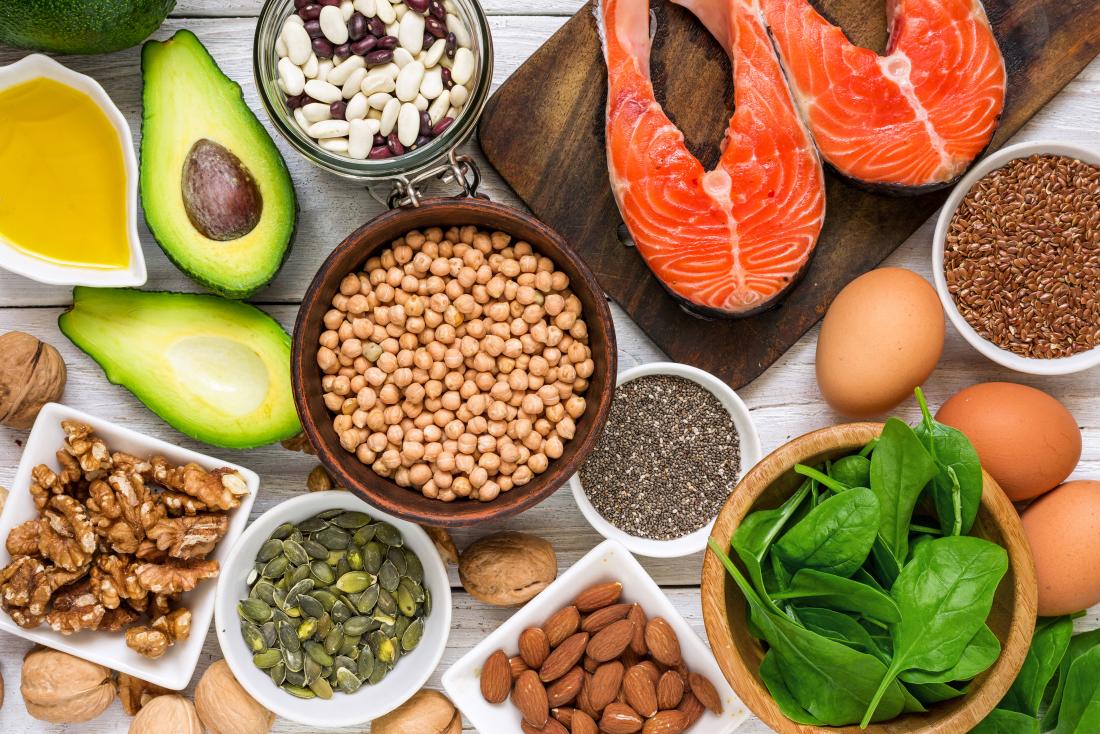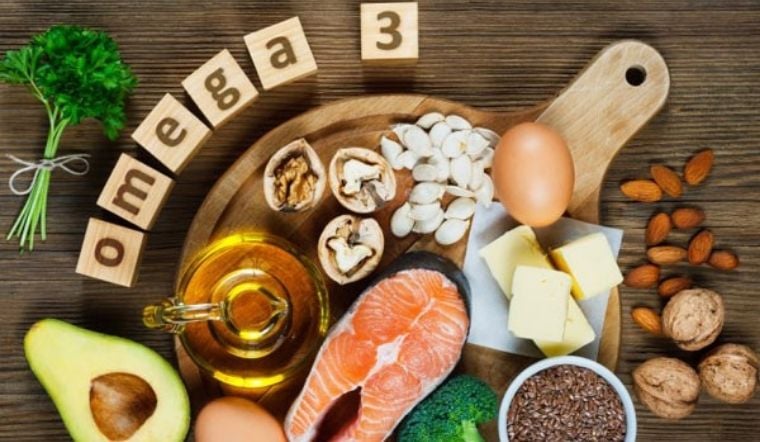Rheumatoid arthritis can strike anyone at any age. Rheumatoid arthritis is different from osteoarthritis, which is a natural wear and tear of joints over time, while rheumatoid arthritis occurs when the body's own immune system attacks the joints, causing pain, stiffness, and inflammation.
1. The importance of diet for people with rheumatoid arthritis
Dietary changes are one way that people with rheumatoid arthritis can support their health. Certain anti-inflammatory foods can help reduce the pain and swelling caused by rheumatoid arthritis.
According to Dr. Nguyen Ngoc Dinh - Department of Examination, Central Hospital of Traditional Medicine, people with rheumatoid arthritis should balance their daily diet and control their calorie intake. They should eat steamed and boiled dishes instead of fried dishes with a lot of oil.

Anti-inflammatory foods help relieve pain.
While diet alone won't cure rheumatoid arthritis, according to the Arthritis Foundation, choosing a healthy, well-balanced diet with the right foods can help control the body's destructive inflammation, provide the nutrients your body needs, and help you maintain a healthy weight.
That's important because excess weight puts extra pressure on painful joints and can make some rheumatoid arthritis medications less effective. What's more, body fat produces proteins called cytokines that promote inflammation.
2. Essential nutrients for people with rheumatoid arthritis
Vitamin D: Rheumatoid arthritis patients face vitamin D deficiency which leads to many complications such as osteoporosis, infections... Therefore, you should eat foods rich in vitamin D such as eggs, milk, seaweed, cod liver oil...
Omega-3 fatty acids: A natural anti-inflammatory, it neutralizes free radicals that cause inflammation and regulates the body's immune response. This nutrient has been shown to reduce the frequency and intensity of rheumatoid arthritis pain. Foods rich in omega-3 fatty acids include salmon, sardines, herring, tuna, walnuts, olive oil, etc.
Fiber: Consuming fiber has been shown to help reduce systemic inflammation, thereby helping to prevent the progression of rheumatoid arthritis. Sources of fiber include vegetables (broccoli, spinach, kale, etc.), seeds (flaxseeds, cashews, walnuts, etc.), and whole grains (barley, brown rice, corn, potatoes, etc.).
Vitamins A, C, E, K: These vitamins have the ability to strongly destroy free radicals that cause inflammation and improve joint pain and swelling. These vitamins are abundant in vegetables (lettuce, bell peppers, tomatoes, carrots, cucumbers, spinach, etc.), fruits (dragon fruit, grapefruit, tangerines, pears, apples, etc.).
Antioxidants: Oxidative imbalance in the body is one of the causes of chronic diseases, including rheumatoid arthritis. Meanwhile, antioxidants such as polyphenols, flavonoids, sulforaphane... have powerful effects in restoring oxidative balance in the body, contributing to soothing inflammation. Sources rich in antioxidants such as green leafy vegetables, nuts, whole grains...
Rheumatoid arthritis patients should note that maintaining a healthy, nutritious diet with natural foods that are beneficial for the disease is best. In case you want or need to supplement vitamins and minerals, you should consult a doctor for advice and prescription to bring the best results and avoid risks due to incorrect use.

Foods rich in omega-3 fatty acids are among the best foods for people with rheumatoid arthritis.
Prebiotics and probiotics: Eating foods rich in prebiotics and probiotics will help stabilize the intestinal flora, strengthen the body's resistance, and reduce joint inflammation. Some foods rich in prebiotics and probiotics include: yogurt, apple cider vinegar, vegetables, whole grains, and nuts.
Calcium: Similar to vitamin D, calcium deficiency is also a common condition in patients with rheumatoid arthritis, especially postmenopausal women. This leads to many dangerous complications such as osteoporosis, joint deformities, infections, cardiovascular disease... Foods containing calcium such as milk, seaweed, beans, cereals...
Iron: People with rheumatoid arthritis face iron deficiency, which causes inflammation to spread. Iron deficiency causes anemia, hindering the transport of oxygen and anti-inflammatory substances to the damaged area. Supplement iron-rich foods such as seafood (mackerel, sardines, tuna, clams, shrimp, etc.), beans, and nuts.
3. Foods that people with rheumatoid arthritis should eat and avoid
Foods to eat
Olive Oil: Oleocanthal, a compound found in extra virgin olive oil, has pain-blocking effects similar to nonsteroidal anti-inflammatory drugs (NSAIDS), such as ibuprofen, making olive oil a great oil to include in your rheumatoid arthritis diet.
Citrus fruits: Oranges, grapefruits, and lemons are rich in vitamin C and are also good sources of anti-inflammatory antioxidants, which are beneficial for people with rheumatoid arthritis. However, citrus can interfere with the body's ability to process certain rheumatoid arthritis medications. Therefore, if you are taking medications that may be affected by citrus, consult your doctor about getting vitamin C from other sources such as tomatoes, peppers, melons, strawberries, kiwis, or potatoes.
If you must avoid taking your medication with citrus juice, drink the citrus juice at a different time of day.
Berries: Blueberries, raspberries, strawberries... contain powerful antioxidants, such as proanthocyanins and ellagic acid, which help fight inflammation and reduce cell damage.
Carrots: Rheumatoid arthritis patients are deficient in vitamin A, which weakens the body's anti-inflammatory and antioxidant capabilities. Carrots are a great source of beta-carotene (a precursor of vitamin A).
Whole grains: Are a better source of fiber and other important nutrients like selenium, potassium, and magnesium than refined grains. In addition, diets rich in whole grains have also been linked to better weight control and reduced pain and symptoms of rheumatoid arthritis.
Ginger: Contains compounds that function similarly to anti-inflammatory drugs, such as aspirin and ibuprofen. Therefore, it is good for people with rheumatoid arthritis.
Garlic: Many studies have demonstrated the positive effects of garlic on rheumatoid arthritis.
Turmeric: Contains curcumin, a natural polyphenol with antioxidant and anti-inflammatory properties. Curcumin helps improve joint swelling and morning stiffness in patients.
Fatty fish: Mackerel, tuna, salmon, herring, sardines... are also a rich source of omega-3, which is very beneficial for people with arthritis thanks to omega-3 fat with anti-inflammatory properties, helping to protect patients from many complications...
Pineapple: Rich in vitamin C and the enzyme bromelain, which has been linked to pain relief and reduced swelling in both osteoarthritis and rheumatoid arthritis.
Green Tea: Green tea is rich in catechins, which disrupt the activation of inflammatory pathways. Its effects on rheumatoid arthritis have long been studied.
Low-fat dairy products: Low-fat milk provides high-quality protein for rheumatoid arthritis patients. In addition, it is also a rich source of calcium, magnesium, vitamins D and K, helping patients maintain a healthy body. In addition to low-fat fresh milk, other products such as unsweetened yogurt, Greek yogurt, etc.
Fermented foods: Fermented soybeans, yogurt, kefir... are foods rich in probiotics, helping to strengthen the immune system and control inflammatory reactions in the body, contributing to ensuring overall health for the patient, while stabilizing swelling and joint pain due to inflammation.
Foods to avoid
Certain foods aggravate rheumatoid arthritis. Therefore, patients should avoid certain foods, including:
Red meat: Beef, buffalo, horse, lamb, goat... are foods that increase the risk of increasing the symptoms of rheumatoid arthritis. Red meat easily causes inflammation, aggravating the symptoms of some diseases such as diabetes, Alzheimer's disease, cancer... Red meat also contains a lot of saturated fat that can cause an inflammatory reaction causing swelling and pain in the joints.
Processed foods: Packaged foods, processed foods contain many additives, sugars and preservatives to help increase shelf life. Therefore, consuming processed foods often increases the possibility of causing inflammation, malnutrition and unhealthy health.
Fried foods: These foods often form harmful compounds that cause oxidation and inflammation. A diet high in fried foods increases the risk of obesity, inflammation, and other chronic diseases.
Sugar and refined flour: Blood sugar spikes cause the body to produce inflammatory chemicals called cytokines, which can worsen rheumatoid arthritis symptoms. These foods can also lead to weight gain, which puts stress on your joints. Limit snacks, sugary drinks, bread, pasta made with white flour, and white rice.
Limit salt intake: Too much salt increases the risk of high blood pressure, increases the risk of infection and causes inflammation. High sodium intake increases the risk of inflammation, which increases the severity of rheumatoid arthritis.
Food Additives: MSG can cause severe inflammatory reactions leading to rheumatoid arthritis and other related diseases. MSG should be replaced with cane sugar or other natural sweeteners.
Gluten: Gluten, a protein found in grains like wheat, rye, and barley, can contribute to inflammation, especially in people with autoimmune disorders like celiac disease or rheumatoid arthritis.
Alcohol: Drinking too much alcohol can cause a spike in reactive protein levels in the body, which can cause inflammation and be detrimental to rheumatoid arthritis.
Source: https://giadinh.suckhoedoisong.vn/che-do-an-cho-nguoi-benh-viem-khop-dang-thap-172240622204753395.htm


































































































![[Infographic] In 2025, 47 products will achieve national OCOP](https://vphoto.vietnam.vn/thumb/402x226/vietnam/resource/IMAGE/2025/7/16/5d672398b0744db3ab920e05db8e5b7d)





Comment (0)